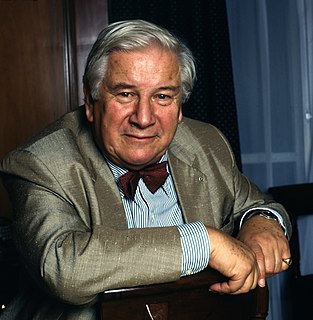A Quote by Simon Sinek
Academic experts may not be good at doing what they are experts in themselves, but they are good at explaining the subject matter to others. They write books, teach courses and offer lessons and give steps others can follow.
Related Quotes
The art of music is good, for the reason, among others, that it produces pleasure; but what proof is it possible to give that pleasure is good? If, then, it is asserted that there is a comprehensive formula, including all things which are in themselves good, and that whatever else is good, is not so as an end, but as a mean, the formula may be accepted or rejected, but is not a subject of what is commonly understood by proof.
Most people consider themselves above the gritty and relentless details of life that allow the creation of great wealth. They leave it to the experts. But in general you join the one percent of the one percent not by leaving it to the experts but by creating new expertise, not by knowing what the experts know but by learning what they think is beneath them.
Traditional religions practices are important.They allow us to share with others the communal experience of adoration and prayer,but we must never forget spiritual experience is above all a practical experience of love,and with love,there are no rules some may try to control their emotions and develop strategies for their behavior,others may turn to reading books of advice from "experts" on relationships but this is all folly.The heart decides and what it decides is all that really matters.
Individuals understood in relational terms cannot be conceived as fully separate from their communities. Others in one's community may already be a part of the self. This conception of the person as overlapping in identity with others has normative implications for what constitutes the good of the individual and how that good relates to the good of others. One's relationship with others can form a part of one's good as an individual, such that one can have a compelling interest in the welfare of these others and in one's relationship with them.
Most of what we know we don't really know first hand. I've never seen a cancer cell. But I trust this community of experts who have, so I believe that cancer exists. But we trust these experts, and we trust that the experts have a system of checks and balances and self-correction. And we have to insist that experts have certain certifications. They're not perfect. Every once in awhile there's an engine falls off the wing of a plane, or a tax audit happens and you find out your expert made a mistake. But it's a pretty good system. It's the best system we've got.
Another of the qualities of science is that it teaches the value of rational thought, as well as the importance of freedom of thought; the positive results that come from doubting that all the lessons are true... Learn from science that you must doubt the experts. As a matter of fact, I can also define science another way: Science is the belief in the ignorance of experts.
Befriending the life in others is sometimes a complex matter. There are times when we offer our strength and protection, but these are usually only temporary measures. The greatest blessing we offer others may be the belief we have in their struggle for freedom, the courage to support and accompany them as they determine for themselves the strength that will become their refuge and the foundation for their lives. I think it is especially important to believe in someone at a time when they cannot yet believe in themselves. Then your belief will become their lifeline.
When we desire to be a blessing, we find that there are many ways in which we can bless others. We can give material goods to others, and we can also offer them the benefit of our experience. People who have faced and overcome challenges with alcohol and drugs often involve themselves in helping others who are experiencing similar difficulties. They understand the value of overcoming the problem. In every area of the human experience, we may find those precious ones who are able and willing to be a blessing to others.
I cannot emphasize enough how wrongheaded this is. Withholding criticism and ignoring differences are racism in its purest form. Yet these cultural experts fail to notice that, through their anxious avoidance of criticizing non-Western countries, they trap the people who represent these cultures in a state of backwardness. The experts may have the best of intentions, but as we all know, the road to hell is paved with good intentions.
The ...experts of the FDA have declared Laetrile to be worthless...quackery and fraud...These experts are the professional descendants of experts...confident that mental illness should be cured by drilling holes in the skull, the better to let the demons out. ...This is the Orwellian fashion in which the medical establishment throws its weight around.
































